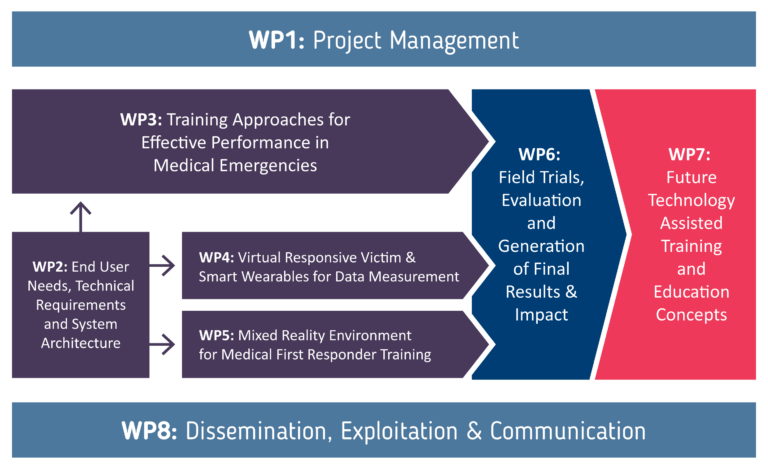Work Packages
The work plan of MED1stMR is divided in 9 distinct work packages, well elaborated to fulfil the requirements of the call and to reach the objectives of the project within 36 months. The WP leaders were well selected, based on their expertise and their focus of research / business. Since the work is highly collaborative, several partners will be involved in each of the work packages.

This group comprises WP1 Project Management and WP8 Dissemination, Exploitation & Communication (Lead: USE) running throughout the entire duration of the project. WP1 will ensure the project’s successful execution and completion by stimulating collaboration and collegiality among the consortium and managing the project in a target-focused manner. WP8 will continuously provide high visibility to the project’s progress, efforts, and outcomes during and after the project.
(Lead: AIT) aims to identify the end users’ needs, requirements, expectations and constraints for future training and novel technologies in the context of medical first responders and to define the basic system architecture for further development in WP4-5. Also, social, societal, management, decision-makers and organizational factors and constraints will be identified.
(Lead: UHEI) will analyse current training methods and compile a best practice catalogue to develop a Multi- Dimensional EPME Model. The goal is to develop innovative training approaches to improve the resilience of MFRs based on the insights of WP2 and the analysis of current methods.
(Lead: PLUX), the touch enabled human manikin, the smart wearables to monitor MFRs’ biosignals and the development of an integration framework for virtual prototyping of novel first responder technologies in MR and a Data Management System of Training Debriefing.
(Lead: RFNS) is the integration of the wearables and manikins into the MR environment (from WP3) to serve for the human factors studies and the final field trials for evaluation (WP6). An innovative results and review dashboard for real-time and after action debriefing will be developed (field of view, movements, procedure applied etc.), stress measurements and psychological evaluations (questions, self-rated, etc.) for evaluating the training session.
(Lead: UHEI) the main features (e.g. Training and evaluation of affective responses, Effectiveness of the training, User experience, influence of personal factors) of the developed training will be tested by the end-user organizations. The feedback will be considered for further development to guarantee an end-user driven continuous approach and improvement.
(Lead: UMU) is to facilitate a shared understanding and knowledge transfer on MR training for MFRs across Europe and to strengthen the knowledge, awareness and importance of novel technologies and MR training. Furthermore, the Implementation Concept for MR Training Setups and Programs for End Users and the results about applicability and implementation of the MR environment for virtual prototyping of new first responder technologies will be developed.
Will ensure that the project complies with all legal and ethical aspects.
